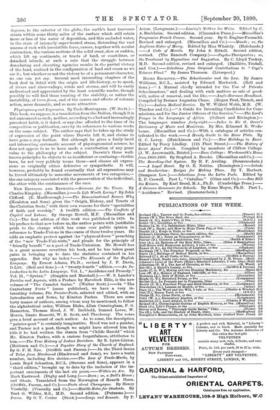not announced as such; neither, according to a bad and
increasingly
prevalent habit, is it dated, or any clue afforded to the time of its composition or publication, save by its references to various works
on the same subject. The author says that he takes up the study of expression at the point where Darwin left it, and claims to have gone a step further. But although he gives a fairly lucid and interesting systematic account of physiognomical science, he does not appear to us to have made a contribution of any great value to the philosophy of the subject. Darwin's three well- known principles he objects to as insufficient or confusing—Gothic laws, he not very politely terms them—and classes all expres- sions as originally either defensive or sympathetic. It will,
however, probably be found eventually that all expressions may be traced ultimately to muscular movements of two categories,— the one category associated with the preservation of the individual, the other with the continuance of the race.


































 Previous page
Previous page